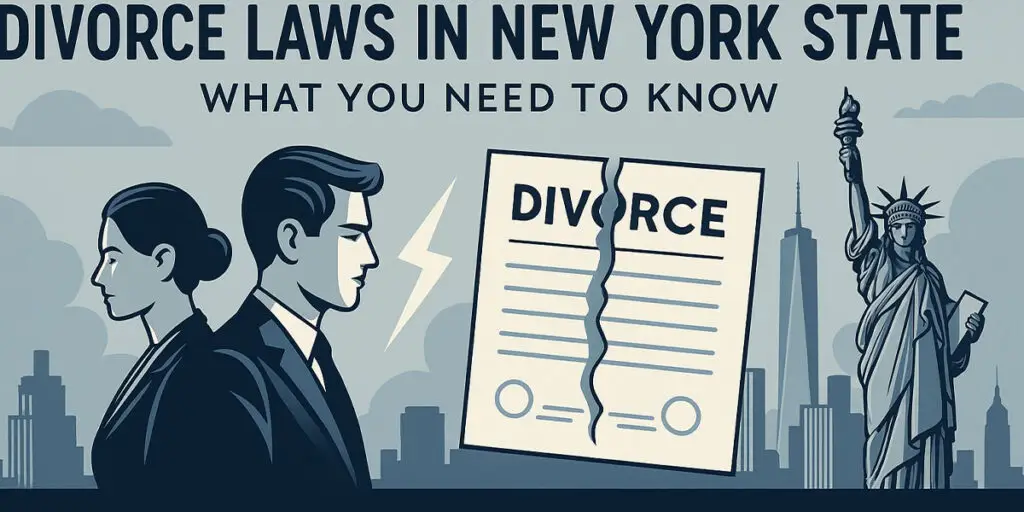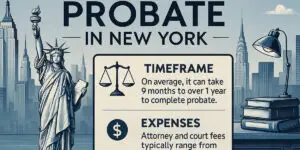Divorce Laws in New York State: What You Need to Know
Going through a divorce is a challenging and emotionally taxing experience. Understanding the divorce laws in New York State is crucial for protecting your rights and making informed decisions about your future. Navigating this terrain might seem daunting and confusing; you are not alone! This comprehensive guide will provide you with a clear and concise overview of the key aspects of New York divorce law, offering insights to help you understand your rights and options. While Morgan Legal Group specializes in Estate Planning, Probate, Guardianship, Elder Law, Wills, and Trusts, it is important to work with a qualified law professional to help you navigate the difficulties of divorce. While the processes are different, legal matters can be challenging and need the appropriate expertise. Remember, we at Morgan Legal Group always puts your best interest first!
This article will cover a range of essential topics, including the grounds for divorce in New York, the process of filing for divorce, the division of property, child custody and support, and the importance of working with a divorce attorney. We’ll also address common questions and concerns that individuals have about divorce in New York, providing you with the knowledge and resources you need to navigate this difficult time. While we suggest a lawyer who has expertise in divorce procedures, you may want to consider our services if you need assistance planning for how this impacts your elder, trust, or will planning; it may help!
Grounds for Divorce in New York
New York is a “no-fault” divorce state, meaning that you can obtain a divorce without having to prove that your spouse did something wrong. However, New York also recognizes several “fault” grounds for divorce. Here’s a breakdown of the grounds for divorce in New York:
No-Fault Ground: Irretrievable Breakdown of the Marriage
The sole no-fault ground for divorce in New York is the irretrievable breakdown of the marriage for a period of at least six months. This means that the relationship between you and your spouse has broken down irretrievably, and there is no reasonable prospect of reconciliation. It is important to emphasize that the law is “no-fault”; the law does not require that one party accept blame for the divorce. This can make the process faster and less expensive, as you are not required to prove marital wrongdoing.
To obtain a divorce based on the irretrievable breakdown of the marriage, you must state under oath that the relationship has broken down irretrievably for at least six months. You must also resolve all ancillary issues, such as the division of property, child custody, and support. These issues have to be addressed before the divorce can be granted. The divorce must be a comprehensive plan including the children’s well-being.
Fault Grounds for Divorce
New York also recognizes several “fault” grounds for divorce, which require you to prove that your spouse engaged in certain misconduct. The fault grounds for divorce in New York include:
- Cruel and Inhuman Treatment: This requires you to prove that your spouse’s conduct endangered your physical or mental well-being and made it unsafe or improper for you to continue living with them.
- Abandonment: This requires you to prove that your spouse abandoned you for a period of at least one year.
- Adultery: This requires you to prove that your spouse engaged in adultery. You must have evidence or proof that your spouse had the alleged affair.
- Imprisonment: This requires you to prove that your spouse has been imprisoned for a period of at least three consecutive years.
While it is possible to obtain a divorce based on fault grounds, it can be more difficult and time-consuming than obtaining a divorce based on the irretrievable breakdown of the marriage. Proving fault grounds often requires gathering evidence, presenting testimony from witnesses, and engaging in lengthy court proceedings. In the absence of significant reasons, it is usually best to proceed as a no-fault divorce. However, in some cases, proving fault grounds can have an impact on the division of property or the award of spousal support. If you are considering seeking a divorce based on fault grounds, it’s important to consult with an experienced divorce attorney to discuss your options.
The Process of Filing for Divorce in New York
The process of filing for divorce in New York involves several key steps:
- Filing a Summons and Complaint: The first step is to file a summons and complaint with the Supreme Court in the county where you or your spouse resides. The summons informs your spouse that you are seeking a divorce, and the complaint outlines the grounds for the divorce and the relief you are seeking (e.g., division of property, child custody, support). Note this may depend on where your family is located. For example, in the Bronx, it may be different than in Albany.
- Serving the Summons and Complaint: You must arrange for your spouse to be served with a copy of the summons and complaint. Service must be performed by someone who is not a party to the divorce and is at least 18. You cannot personally serve the paperwork. You must follow the protocols laid out in New York Law.
- Filing an Affidavit of Service: After your spouse has been served, the person who performed the service must file an affidavit of service with the court. The affidavit of service is a sworn statement that confirms that your spouse was properly served with the summons and complaint.
- Your Spouse’s Response: After being served, your spouse has a certain amount of time (typically 20-30 days, depending on how they were served) to respond to the complaint. They can file an answer, which admits or denies the allegations in the complaint, or a notice of appearance, which indicates that they intend to participate in the divorce proceeding.
- Negotiation and Discovery: After your spouse has responded, the parties will typically engage in negotiations to try to reach a settlement agreement on all of the ancillary issues in the divorce, such as the division of property, child custody, and support. If negotiations are unsuccessful, the parties will engage in discovery, which involves exchanging information and documents to gather evidence for trial.
- Trial (If Necessary): If the parties are unable to reach a settlement agreement, the case will proceed to trial. At trial, both parties will have the opportunity to present evidence and testimony to the court. The court will then make a decision on all of the outstanding issues in the divorce.
- Judgment of Divorce: Once all of the issues in the divorce have been resolved, the court will issue a judgment of divorce, which officially terminates the marriage and outlines the terms of the divorce agreement or the court’s decision.
Division of Property in New York Divorce
New York is an “equitable distribution” state, meaning that marital property is divided fairly, but not necessarily equally, between the parties in a divorce. Marital property is defined as all property acquired by either party during the marriage, regardless of who owns it. Separate property is property acquired before the marriage, inherited during the marriage, or received as a gift. Separate property is generally not subject to division in a divorce unless it has been commingled with marital property. It is essential to ensure that all property is handled and divided fairly!
When dividing marital property, the court will consider a variety of factors, such as:
- The income and property of each party at the time of the marriage and at the time of the divorce
- The length of the marriage
- The age and health of each party
- The need for the custodial parent to occupy the marital residence
- The loss of inheritance and pension rights
- Any wasteful dissipation of assets by either party
- Any other factor that the court deems just and proper
The court has broad discretion in dividing marital property, and it can consider a variety of factors to ensure a fair and equitable result. Common assets that are divided during a divorce process can include:
- Stocks
- Bonds
- checking and saving accounts
- businesses
- other investments
Often, some steps can be taken to determine which property is owned jointly or separately. Work with a qualified family lawyer to learn more. It’s important to be well prepared in case you think you will go down this path. It is not wise to “hope” you never need that support; to ensure your best interest and that of your loved ones, take action today.
Child Custody and Support in New York Divorce
In divorces involving children, the court must make decisions about child custody and support. The court’s primary concern is always the best interests of the child. Child custody can be divided into two categories: legal custody and physical custody.
Legal Custody
Legal custody refers to the right to make decisions about the child’s education, healthcare, and religious upbringing. Legal custody can be awarded to one parent (sole legal custody) or shared by both parents (joint legal custody). Joint legal custody is more common, as it allows both parents to be involved in the child’s life and upbringing.
Physical Custody
Physical custody refers to where the child lives. Physical custody can be awarded to one parent (sole physical custody) or shared by both parents (joint physical custody). Joint physical custody typically involves a schedule where the child spends time living with each parent.
When making decisions about child custody, the court will consider a variety of factors, such as:
- The child’s wishes (if the child is old enough to express a preference)
- The parents’ ability to provide a stable and nurturing environment
- The parents’ ability to co-parent and communicate effectively
- The child’s relationship with each parent and with siblings
- The child’s adjustment to their home, school, and community
Child support is the financial support that one parent pays to the other parent to help cover the costs of raising the child. In New York, child support is calculated based on a formula that takes into account the parents’ incomes, the number of children, and certain other expenses, such as healthcare and childcare costs. It is important to properly fill out this information with the appropriate figures to ensure a fair outcome. Reach out to Morgan Legal Group to assist.
Spousal Support (Alimony) in New York Divorce
Spousal support, also known as alimony, is financial support that one spouse pays to the other spouse after a divorce. Spousal support is not always awarded in a divorce, and it is typically based on the financial needs of one spouse and the ability of the other spouse to pay. Spousal support is different than child support. In these cases, spousal support is determined based on many factors:
- Spousal Support can continue until either ex-partner dies or remarries.
- Length of the marriage and whether the spouse will be able to support themselves.
- In the case of disability, there is spousal support and additional payments for personal care and support.
When determining whether to award spousal support and the amount and duration of the support, the court will consider a variety of factors, such as:
- The income and property of each party
- The length of the marriage
- The age and health of each party
- The earning capacity of each party
- The need of one party to incur education or training expenses
- The existence of any prenuptial or postnuptial agreements
- Any other factor that the court deems just and proper
There are several types of spousal support in New York, including temporary spousal support (paid during the divorce process), durational spousal support (paid for a fixed period of time), and permanent spousal support (paid until the recipient remarries or dies).
The Importance of Working with a Divorce Attorney in New York
Going through a divorce is a complex and emotionally challenging process. Working with an experienced divorce attorney can provide invaluable benefits, such as: These reasons are just a few examples of how a professional team can help.
- Navigating the legal and procedural requirements of divorce in New York
- Protecting your rights and interests throughout the divorce process
- Negotiating a fair settlement agreement with your spouse
- Advocating on your behalf in court, if necessary.
Expert Legal Guidance
A divorce attorney can provide expert guidance on all aspects of your divorce case, helping you understand your rights and options and make informed decisions. An attorney will always has your best interest in mind, which is an invaluable source during these tough circumstances.
Protecting Your Rights
A divorce attorney can protect your rights and interests throughout the divorce process, ensuring that you receive a fair settlement agreement or court decision. Make sure to do everything in your power to protect your future.
Negotiating a Settlement
A skilled divorce attorney can negotiate a settlement agreement with your spouse that is fair and equitable to you. This can help you avoid the cost and stress of going to trial.
Advocacy in Court
If your case proceeds to trial, a divorce attorney can advocate on your behalf in court, presenting evidence and testimony to support your case. This is the reason to have a professional and experienced attorney is beneficial. Make sure you go into these proceedings feeling prepared and able to win your case.
Resources for Individuals Facing Divorce in New York
There are several resources available to help individuals facing divorce in New York:
- **The New York State Bar Association:** Offers resources and information about family law and divorce.
- The NY Courts









